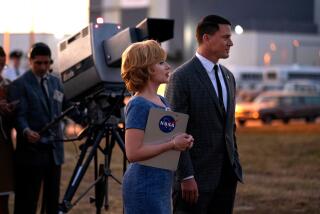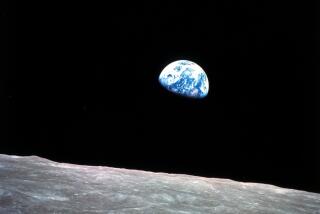Moon Over ‘Apollo 11’ : FAMILY CHANNEL DOCKS UP WITH THE MISSION THAT HAD A HAPPY ENDING
- Share via
Twenty-seven years after the fact, one of the greatest achievements of the century is finally getting the TV movie treatment.
“Apollo 11,” airing Sunday on the Family Channel, chronicles the historic moon landing of July 20, 1969, when astronauts Neil Armstrong and Buzz Aldrin, with the support of Michael Collins in the command ship, became the first Earthlings to set foot on another celestial body in outer space.
With the dozens of TV movies turned out every year about psychopathic killers, women in distress and people battling disease, it seems astonishing that the uniquely American story of Apollo 11’s triumph has not been dramatized until now. Executive producer James Manos Jr. believes the main reason is that, “at first glance it didn’t seem as if anything dramatic happened”--the mission went off almost exactly as planned.
Ex-astronaut Aldrin, who served as a technical consultant on the film, concurs. “Success isn’t overly dramatic at times,” he says. “In some ways, the test will be, are [viewers] interested in suspenseful drama or are they interested in meaningful achievement? Apollo 11 was a meaningful achievement.”
But Manos says the mission wasn’t “as seamless or as flawless as the general public was led to believe at the time.” After extensive research, the filmmakers decided to concentrate on how NASA and the astronauts were in a heated race against time--determined to beat the Russians to the moon. NASA had just one year to get Apollo 11 and its crew ready for blastoff.
“They were going to do something Herculean while the world essentially was falling apart,” Manos says. “They put blinders on and just went about it with an extraordinary monastic type of sensibility. Meanwhile, the Tet offensive was happening [in Vietnam], there were race riots--and these men just barreled right through.”
Gus Lucas, senior vice president of programming for the Family Channel, says the box-office and critical success of 1995’s “Apollo 13” prompted executives at the cable network to think about why nothing had been done on Apollo 11.
“The more we thought about it, the more excited we got about it,” Lucas says. “Virtually everyone who was alive at that time remembers where they were the night that man walked on the moon.”
Aldrin, who recently wrote a science-fiction novel, “Encounter With Tiber,” lectures throughout the world on space efforts and says people are always telling him where they were when he and Armstrong stepped on the lunar surface.
“There’s almost a compulsion to tell me where they were,” he says. “That fact has prompted me to try and explore what that means. To me, that means there was value added to human lives as a result of that episode, that event, that achievement. It made people feel good enough to remember the day in their lives. That is what we got by going to the moon--not just the rocks.”
With Jeffrey Nordling playing Armstrong, Jim Metzler as Collins and Xander Berkeley as Aldrin, “Apollo 11” got permission from NASA to shoot at the original Mission Control Center at the Johnson Space Center in Houston, used during the actual moon landing.
“It had been laying dormant for 10 years,” Manos says. “There were quite a few engineers who showed up the day that we got there to start talking about what we would do to the room to make it work.
“The men who were there helped bring these men to the moon and back. They all started chipping in and saying, ‘I can help you recreate 1969’; ‘I know how I can make the computer work for you.’ NASA could not have been more accommodating. It was great going into that room. It takes your breath away.”
Aldrin visited the set several times and even appeared in a cameo opposite his small-screen alter ego, Berkeley. But don’t bother looking for him in the finished product.
“I played the part of the preacher who had arranged to give [Aldrin] the elements of communion so he could serve himself communion on the surface of the moon,” he explains.
But the scene was scrapped. “I would love to say I play a role in this,” Aldrin says with a chuckle. “But my role is on the cutting-room floor.”
Following the two-hour movie will be a 90-minute special, “From the Moon to Mars,” which will explore space, the Mars fossil, plans to send a spacecraft to Mars and possible human exploration of the red planet. Scheduled guests include Aldrin; Donna Shirley, head engineer and manager of Mars exploration; author Robert Zubrin, and Bernard Harris, the first African American to walk in space.
Aldrin is enthusiastic about the call-in special and the opportunity to talk about the future of space exploration.
“I would like to see it become a major long-range objective that will help this nation move into the next century,” he says. “We need to expand human presence to establish, in a meaningful way, a permanent settlement that grows and expands on the surface of Mars. If we go there once or twice and then some politician says, ‘We’ve done that,’ it will have been a total failure.
“Apollo 11 was a success in what it set out to do, but in furthering man’s venturing outward into space, it was a failure. We did something and stopped doing it. It shouldn’t happen in the future. It can’t happen on Mars.”
“Apollo 11” airs Sunday at 7 p.m. on the Family Channel; “From the Moon to Mars” follows at 9 p.m.
More to Read
The complete guide to home viewing
Get Screen Gab for everything about the TV shows and streaming movies everyone’s talking about.
You may occasionally receive promotional content from the Los Angeles Times.







